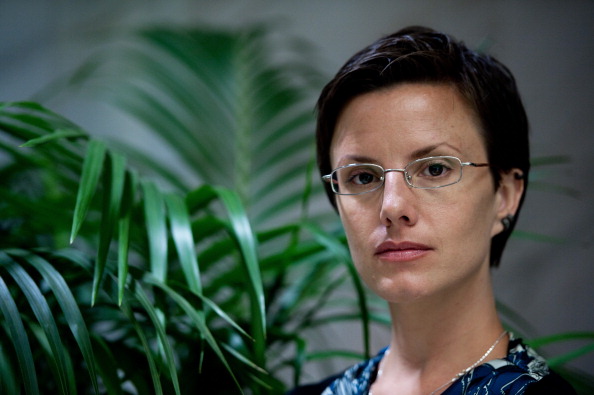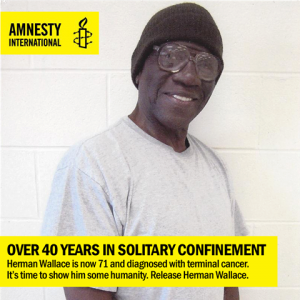
Sarah Shourd was one of three U.S. hikers arrested by Iran in 2009 on espionage charges. Shourd was held in solitary confinement for 410 days (Photo Credit: Paul J. Richards/AFP/Getty Images).
Until recently, both Herman Wallace and Albert Woodfox had been held in solitary confinement for 4 decades in Louisiana – longer than almost any other known prisoner in recent U.S. history. It’s long enough for one’s body to forget it ever knew anything else but four white walls and for the mind to be reshaped by extreme isolation. Juan Mendez, the United Nations Special Rapporteur on Torture, says that after 15 days, further isolation can cause permanent psychological damage and constitute torture.
Herman has just been diagnosed with stage 5 liver cancer. Unless Governor Bobby Jindal of Louisiana grants him clemency, he may likely die in prison.
After decades in isolation, people experience hyper-anxiety, paranoia, insomnia, hallucinations, emotional detachment, panic attacks and uncontrollable rage. Many start fights with guards just for human contact. Others cut themselves just to be taken out of their cells for a few days in the prison hospital.
Herman is not a dangerous criminal - he is a 71-year-old cancer patient who has already survived an unthinkable nightmare.
After spending nearly 41 years in a cramped cell, the cancer diagnosis led prison officials in July to transfer 71-year-old Herman to a ten-bunk prison dorm.
“He can now open a door,” says Marina Drummer, who has been advocating on his behalf for the past 15 years. “He can walk from the dorm room into the dayroom without being shackled.”
After spending 23 hours a day isolated in a small cell akin to a coffin, this change is monumental.
In 1972, Albert and Herman, two young black men, were charged and convicted of the murder of prison guard Brent Miller, despite the fact that no DNA evidence linked them to the crime. They were locked in solitary: 23 hours a day alone in a small cell, and were denied any meaningful review of their continued isolation.
In the decades after the trial, significant flaws in the legal process have come to light. Evidence suggests that the key eye-witness was bribed by prison officials into giving statements against the men and that the state withheld evidence that pointed to Herman and Albert’s innocence. Potentially exculpatory evidence mysteriously went “missing” before the trial and more witnesses later recanted their testimony.
 After Herman’s diagnosis became known, human rights groups around the country – most notably Amnesty International – have called for his release on compassionate and medical grounds. More than 46,000 people in the U.S. have called on Governor Jindal to release Herman Wallace in the months since his diagnosis; tens of thousands of appeals have also poured in from around the world.
After Herman’s diagnosis became known, human rights groups around the country – most notably Amnesty International – have called for his release on compassionate and medical grounds. More than 46,000 people in the U.S. have called on Governor Jindal to release Herman Wallace in the months since his diagnosis; tens of thousands of appeals have also poured in from around the world.
Herman is not a dangerous criminal – he is a 71-year-old cancer patient who has already survived an unthinkable nightmare. His continued imprisonment serves no purpose: prison records demonstrate that he is no threat to himself or others. As his conviction continues to be challenged before the courts, his cancerous tumor continues to grow. Despite treatment, he does not have much time left.
I recently turned 35. Herman Wallace has survived more years being psychologically tortured in our prisons than I’ve even been alive. I think about him still waking up every morning, tired and sick, but still fighting for his life and his long-deserved freedom. As Herman’s health fails, we have to fight for him – and there’s not much time left.
Sarah Shourd is an author and contributing editor at Solitary Watch currently based in Oakland, California. She spent 410 days in solitary confinement while held as a political hostage by the Iranian Government in 2009-2010. Before being captured Shourd was living in a Palestinian Refugee Camp in Damascus, Syria working as a journalist and teaching for the Iraqi Student Project. She’s written for The New York Times, CNN, Newsweek’s Daily Beast and has a blog on Huffington Post. Her memoir, Sliver of Light: Three Americans Imprisoned in Iran, will be published by Houghton-Mifflin Harcourt in March 2014. Please visit sarahshourd.com and solitarywatch.com for more information and follow Sarah on Twitter at @SShourd.
In 1967 while attending a small conservative college in the bible belt of East Texas a wrote a paper on out prison system for an English class. My professor gave me a C and a copy of a bible and was worried about me. Most people don’t understand or even think about the causes of crime and our blind justice system.
After so many years of being away how would he cope with the new world? Even the thought of his struggles in this new world (possibly) makes my imagination gravid with sorrow and worry.